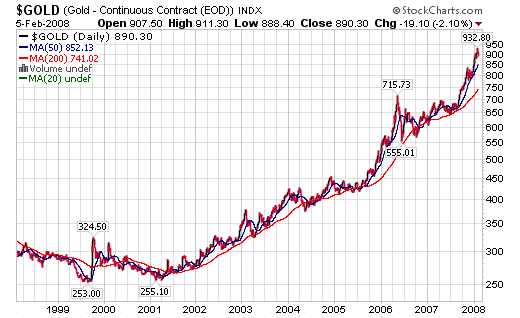Response to Subprime Article by Nobel Prize Winner Joseph Stiglitz
Economics / Subprime Mortgage Risks Feb 07, 2008 - 07:45 PM GMTBy: John_Lee
 Mr. Joseph E Stiglitz, a Nobel Prize winner in 2001 for his work on the economics of information, recently attended the World Economic Forum in Davos and wrote an article published on February 5th, 2008 titled:
Mr. Joseph E Stiglitz, a Nobel Prize winner in 2001 for his work on the economics of information, recently attended the World Economic Forum in Davos and wrote an article published on February 5th, 2008 titled:
Sub-prime crisis has led to the humbling of America.
http://www.nationmultimedia.com/2008/02/05/pda/opinion_30064446.html
The article highlights were:
1. Those who think that globalization, technology, and the market economy will solve the world's problems seemed subdued.
2. If we know the price of cream and the price of skim milk, we can figure out the price of milk with 1 per cent cream, 2 per cent cream, or 4 per cent cream. There might be some money in repackaging, but not the billions that banks made by slicing and dicing sub-prime mortgages into packages whose value was much greater than their contents.
3. Mr. Stiglitz also argued that central bankers also got it wrong by misjudging the threat of a downturn and failed to provide sufficient regulation. They waited too long to take action. Because it normally takes a year or more for the full effects of monetary policy to be felt, central banks need to act pre-emptively, not reactively.
4. This is the third US crisis in the past twenty years, after the Savings & Loan crisis of 1989 and the Enron/World.Com crisis in 2002. Deregulation has not worked. Unfettered markets may produce big bonuses for CEO's, but they do not lead, as if by an invisible hand, to societal well-being. Until we achieve a better balance between markets and government, the world will continue to pay a high price.
For any economic problem, it's interesting how Keynesian economists always find the greedy bankers guilty, the public innocent, and the government responsible for prevention AND a cure through regulation.
Mr. Stiglitz correctly explained how the subprime problem started. However he failed to point out the root cause. The cause is not globalization, deregulation, technology, or free market. The bankers were greedy to lend to earn interests, and the public were greedy to borrow money and spend on things they couldn't afford.
But how can we fault Johnny who loans his money to Jane that can't pay back? We can't blame the government for not regulating the lending industry. The banks didn't jam the money down our throat or force us to sign the dotted line did they?
Government actions often times have good intentions but with unintended consequences. Should the government be more proactive in lowering interest rates and early bailouts as Mr. Stiglitz suggests, this would amount to loosening monetary policies, or to put it more bluntly, money printing, which is a stealth wealth transfer by diluting savings of others.
Those who study the history of money understand the cause of the debt bubble is composed of two factors:
The centralized interest rate model and the fractional reserve system.
- The Fed unilaterally sets the national interest rates, which indiscriminately applies to Bob, Jane, and everyone else. The economy endured several years of unprecedented, historic low interest rates below 3% since 2001. Low interest rates encourage excessive borrowing, and ultra low interest rates like 1% exacerbate the problem even more.
- Through the fractional reserve banking system installed in 1913, banks can print money out of thin air and lend to earn an interest. This magic of making something from nothing leads to lax lending standards. The Fractional reserve banking system is also directly responsible for gas prices going from .15 cents a gallon in 1910 to today's $4 a gallon.
The solution is less regulation, not more as Mr. Stiglitz or Mr. Obama have proposed. Set the market truly free. Let every individual lender, not the Fed, decide what interest rate to apply to each of his borrowers. Eliminate fractional reserve banking and phase out the Fed, this will restore confidence of the dollar, restrict excessive spending by all levels of government and consumers, fix the money supply, and stop frivolous lending. Remove all government sponsored enterprises, other government guarantee and bailout programs. Those programs and agencies only distort markets, offer a false sense of security, and contribute further to inequality.
We can't regulate the patient who wants to overdose on painkillers. We shouldn't over burden all banks with piles of rules designed to prevent a few outlaw borrowers either. Remove the government as the safety net and return the responsibility back to the people. Let the careless and the weak fall, isn't that what capitalism, evolution, and free markets are all about?
Until then, dollar will continue to lose value and gold and oil will continue to rise in dollar terms.

For those who are interested in the gold and resource market, a good introduction will be to visit for free , the world's most attended resource investment conference. Hosted by Cambridge House, the next event will be held this February 9th through 10th in sunny Phoenix, Arizona. An interview between me and the conference's president is available at www.goldmau.com
John Lee, CFA
johnlee@maucapital.com
John Lee is a portfolio manager at Mau Capital Management. He is a CFA charter holder and has degrees in Economics and Engineering from Rice University. He previously studied under Mr. James Turk, a renowned authority on the gold market, and is specialized in investing in junior gold and resource companies. Mr. Lee's articles are frequently cited at major resource websites and a esteemed speaker at several major resource conferences.
John Lee Archive |
© 2005-2022 http://www.MarketOracle.co.uk - The Market Oracle is a FREE Daily Financial Markets Analysis & Forecasting online publication.



